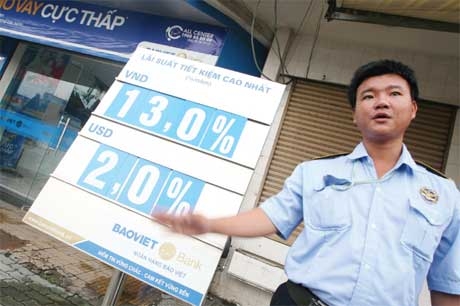Banks court customers as capital tightens up

Based on figures from September’s regular government press conference in Hanoi, from the beginning of this year to the end of August, the growth pace of new deposits reached 11.23 per cent. Meanwhile as of September 20, the banking system’s credit growth was 2.35 per cent.
Many banks are continuing to attract customers by raising their deposit rate of 12.5-13 per cent for deposits with maturities of 12 and 13 months. Until now, the banks have joined join the race are Bac A Bank, Dong A Bank, Western Bank, Saigon-Hanoi Bank, Eximbank, ACB, TienPhong Bank and Dai A Bank.
One of the primary reasons for the race is Circular 21/2012/TT-NHNN, which imposed stricter requirements on lending, borrowing, trading term valuable papers among credit institutions when it came into effect in early September.
Under Circular 21, borrowers must not have overdue debts from 10 days or more for interbank transactions at the time of the transaction.
As a result, interbank transaction volume in September reduced sharply by 60 per cent from August, according to figures from National Financial Supervisory Commission.
Specifically, according to State Bank weekly report on interbank market, the average VND transaction volume was down from around VND24,000 billion ($1.15 billion) in August to VND15,000 billion ($0.72 billion) in September.
Moreover, the circular also banned credit institutions and foreign bank branches from depositing their money and receiving deposits in other credit institutions and foreign bank branches.
Based on consolidated financial statement of eight listed banks for the first half this year, total money deposits of those banks at other credit institutions reached VND285,267 billion ($13.7 million), up by 25.7 per cent year on year.
When the deposits among banks is banned, the deposits from larger banks that add liquidity in weaker banks is withdrawn. Weaker banks must try to mobilize deposits from the public.
According to experts, banks try to raise the rate of deposits as they find difficulty in borrowing on interbank market and their capital is stagnated in the non-performing loans. Many enterprises facing hard times have not repaid bank loans on time, requiring those banks to seek money for loan roll-overs.
“There is also possibility that banks are mobilizing to invest in corporate bonds,” said economic expert Nguyen Dai Lai.
What the stars mean:
★ Poor ★ ★ Promising ★★★ Good ★★★★ Very good ★★★★★ Exceptional
Related Contents
Latest News
More News
- 0.1 per cent tax proposed on each transfer of digital assets (February 05, 2026 | 17:27)
- Ministry of Finance tightens policy delivery at start of year (February 05, 2026 | 17:26)
- Vietnam steps up market reforms as FTSE Russell reviews upgrade progress (February 05, 2026 | 17:20)
- 2025 profits mixed amid strong energy and farming results (February 05, 2026 | 17:18)
- Cashless payments hit 28 times GDP in 2025 (February 04, 2026 | 18:09)
- SSIAM and DBJ launch Japan Vietnam Capital Fund (February 04, 2026 | 15:57)
- Banks target stronger profits, credit growth in 2026 (February 04, 2026 | 15:43)
- Vietnam on path to investment-grade rating (February 03, 2026 | 13:07)
- Consumer finance sector posts sharp profit growth (February 03, 2026 | 13:05)
- Insurance market building the next chapter of protection (February 02, 2026 | 11:16)

 Tag:
Tag:




















 Mobile Version
Mobile Version